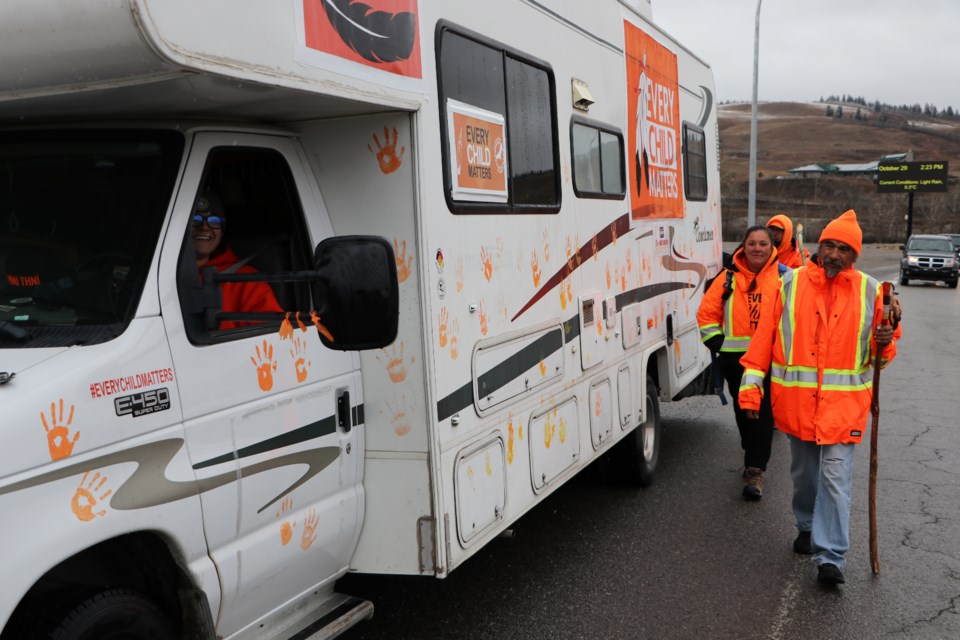An Indigenous woman from Manitoba carries precious cargo on her back on her trek to Kamloops, having departed from Morley Oct. 30.
Stoney Nakoda Nation was just one of many stops on Jazz Lavallee's journey, which began Sept. 1, walking from Winnipeg to the memorial site in Kamloops for 215 Indigenous children that were found in an unmarked grave at a former residential school late last May.
With her, Lavallee carries about 50 pairs of children's moccasins in her backpack, all gifted to her along the way. She said she plans to place them at the memorial site in Kamloops when they reach their destination, which is another 665 km down Highway 1.
"I carry them everywhere," Lavallee said. "We treat them like a baby. They don't touch the ground and they're smudged every morning. We talk to them like a child."
Lavallee is joined by her partner Jeanette Klassen, friend and father figure Virgil Moar, River Steele of Peguis First Nation and Vernon Dustyhorn of Regina, Sask.
"When the news of the 215 [children] first came out, I tried to ignore it," Lavallee said. "It sounds ignorant, but I just knew this would be the number to break my heart. Every Indigenous person across Canada and the United States just knew that there was a lot more coming than this. This was just the wake."
Lavallee said in that moment she wanted to run. Both her mother and aunt had been put through day school, where First Nations, Métis and Inuit children were sent during the day and then were returned to their parents in their communities.
"My mom always said she was blessed because she got to come home at the end of the day, which is a twisted way of looking at it," she said.
Her anger over residential schools became so strong she felt she had to do something with it, she said, and Moar encouraged her to sleep on it.
"I went home and thought about it," said Lavallee. "I was born with dislocated hips and they told my mom that I would never walk but she says I learned to walk before I could crawl. I kept thinking there's a reason for this ... and my feet burned, which was really weird. Ever since I started paying attention to the news, I was putting them in ice water and against fridges. So that's what told me that I have to walk."
When she told Moar of her intentions to walk from Winnipeg to Kamloops, Lavallee said he told her he would not allow her to go alone and become another statistic of missing and murdered Indigenous women.
The group has so far walked about 1,400 kilometres and Lavallee has gone through four pairs of shoes. All the while, she said, the weather has been clear for them.
"I've never been out of Manitoba," she said. "It is so nice to see the mountains, I've never seen them before."
The group got their first taste of snow on the journey while leaving Morley at 2:15 p.m. on Oct. 30.
They have been stopping in First Nations and at residential school sites all along their journey and Stoney Tribal Administration cultural liaison Jeanette Wildman planned to join the group for prayers at the site of the former Morley Residential School just before their departure.
Local Stoney Nakoda man Conrad Labelle said he had the privilege to walk into Morley with the group when they arrived on the reserve, joining them at a truck stop just outside of town.
"I wanted to welcome the group into the reserve, my hometown, giving them various place names and locations," Labelle said. "My mom and dad both went through the [residential school] system and I hate to say that I'm a product of it, but unfortunately I am. A lot of people from here went through that, so in a way I'm representing my Nation and just trying to do my part helping out with these Every Child Matters residential school walks. It's pretty humbling. It touches things inside you're body that you never thought had feelings."
Lavallee is not the first Indigenous person to walk through Stoney Nakoda First Nation on their way to Kamloops this year.
Shayna Taypotat, a member of Kahkewistahaw First Nation, Sask. walked from her home Nation to the site of the former residential school in Kamloops, stopping at the Stoney Nakoda Casino where she was welcomed by local Stoney Nakoda members and Elders with a ceremony in late July.
So far, the bodies of 1,874 Indigenous children have been found in unmarked graves at former residential school sites across the country with many investigations still underway or that have yet to begin.
To keep up with and support Lavallee and her group as they make their trek through the mountains and into B.C., follow their Facebook page '215+ I Wanna Come Home.'



